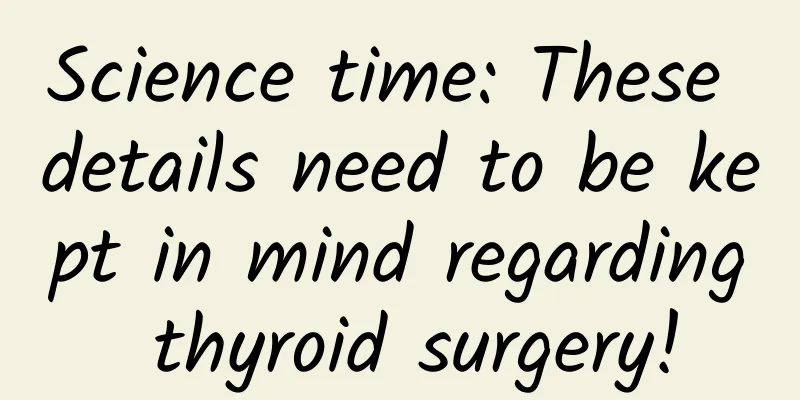Science time: These details need to be kept in mind regarding thyroid surgery!

|
The thyroid gland is an endocrine gland in the human body that is shaped like a butterfly. It is mainly responsible for the production and release of thyroid hormones, which play an important role in maintaining the body's metabolism, temperature regulation, energy consumption, and the normal functions of multiple organs such as the heart, muscles, and digestion. Although there are many people with thyroid diseases, do not all patients need surgical intervention? In fact, for general thyroid nodules, if the lesions are found to be small in size and have no malignant characteristics, observation and follow-up can be chosen. For some high-risk factors, such as malignant tumors, enlarged lesions, lesions that cause some discomfort to the neck, changes in voice, and swallowing difficulties, surgical intervention may be required. This article will take everyone to explore "those things" about thyroid surgery. If your thyroid gland isn't functioning properly, it may cause the following symptoms: Hyperthyroidism: The thyroid gland is overactive and produces too much thyroid hormone. Symptoms include palpitations, weight loss, sweating, anxiety, tremors, insomnia, muscle weakness, irregular menstruation, etc. If not treated in time, hyperthyroidism may affect the cardiovascular system, bones, digestive system, etc., and increase the risk of cardiovascular disease, osteoporosis, etc. Hypothyroidism: Underactive thyroid gland, symptoms include fatigue, weight gain, constipation, depression, muscle weakness, memory loss, etc. Thyroid nodules: lumps appear in the thyroid gland. Most nodules are benign, but malignant (cancerous) nodules may also exist. Nodules may cause symptoms such as throat discomfort, difficulty swallowing, and hoarseness. Thyroiditis: including acute thyroiditis and chronic thyroiditis, symptoms include thyroid enlargement, sore throat, fever, etc. Chronic thyroiditis may lead to hypothyroidism. Thyroid cancer: Nodules are the main manifestation. Early thyroid cancer usually has no obvious symptoms, but it may cause goiter, neck lumps, throat discomfort, etc. Further spread may affect lymph nodes and other organs. Who needs thyroid surgery ? Patients with a confirmed diagnosis of malignant nodules; The nodules are too large to affect daily life; Conservative treatment is ineffective; Difficulty breathing and swallowing; The nodules grow rapidly, suddenly increasing in size within a short period of time; With hyperthyroidism and no response to oral medications; Thyroid surgery mainly includes thyroid lobectomy (+ isthmus) and total thyroidectomy . So what should we pay attention to during thyroid surgery? Precautions before thyroid surgery: Preoperative examination: Before surgery, the patient will undergo a series of examinations, including physical examination, thyroid function test, and imaging examination to determine whether surgery is needed and to make preoperative preparations. Stop taking antithyroid drugs: If the patient has previously used antithyroid drugs to control diseases such as hyperthyroidism, it may be necessary to stop taking the drugs before surgery to reduce the risk of bleeding during surgery. Before stopping the drugs, consult a doctor and follow the doctor's advice and guidance. In addition, a few days before surgery, patients should avoid using drugs that affect coagulation function, such as aspirin, salmetidine, nonsteroidal anti-inflammatory drugs, etc. If you must use them, you should consult a doctor and follow the doctor's advice. Hygiene check: Before the operation, the patient needs to keep the body clean and perform proper skin disinfection according to the doctor's instructions to reduce the risk of infection. Diet and drinking: 12 hours before surgery, patients should stop eating solid food and drink water or other nutritious liquids according to the doctor's instructions to avoid vomiting during surgery. Things to note after thyroid surgery: Pay attention to diet: In the first few days after surgery, soft or liquid diet may be required until the patient can eat normally, gradually resume normal diet, and avoid overheated, irritating or rough food. Avoid spicy and irritating food, food that is easy to cause allergies, fried and grilled food, and maintain proper water intake. Before removing the drainage tube, reduce high-protein and high-fat diet, which is conducive to wound recovery. For patients who have undergone total thyroidectomy, if the pathological results are benign and there are no dietary taboos, you can eat with confidence. Wound care: The incision dressing on the neck can be removed 5-7 days after thyroid surgery. The patient should follow the doctor's instructions to properly clean and care for the surgical incision, keep the incision dry and clean, and then use some scar removal medications. If redness, swelling, exudation, signs of infection or abnormal pain occurs, be sure to inform the doctor in time. Watch out for complications: Thyroid surgery has some potential complications, such as vocal cord injury, hypocalcemia, and incision infection. If you experience unusual symptoms such as voice changes, neck swelling, difficulty breathing, numbness or twitching in your fingers, please seek medical attention immediately. In short, thyroid surgery is a common method of treating thyroid diseases. If symptoms of thyroid disease occur, do not worry too much. As long as standardized treatment is given, the harm can be reduced. Recovery after thyroid surgery is a long process. Patients should also pay attention to maintaining a happy mood. If any discomfort occurs, go to the hospital for examination and treatment in time. (Zhou Liping, Affiliated Cancer Hospital of Zhengzhou University) |
<<: Is the operating room really that scary? Learn about the surgical process in three minutes
>>: Can vinegar control blood sugar and even prevent diabetes?
Recommend
Two lines on blood test but no pregnancy
Early pregnancy test strips are a popular way to ...
Why do women snore when they sleep?
Girls are a happy group of people. Girls refer to...
Amway garlic tablets for gynecological diseases
Amway Nutrilite Garlic Tablets can inhibit the gr...
Unmarried girls have black lines on their stomachs
It is also a common phenomenon for unmarried wome...
Eat these 9 kinds of weight-loss vegetables regularly and you won’t gain weight
Vegetables are rich in nutrients such as vitamins...
Don’t worry about children’s tinea capitis, these five-word guidelines will help you!
Author: Li Ruoyu, Chief Physician, Peking Univers...
Will amniotic fluid leak during pregnancy?
It is possible that amniotic fluid will leak duri...
Will having sex two days before menstruation cause delayed menstruation? Experts tell you the answer
You can have sexual intercourse two days before m...
Pregnant women can drink calcium zinc oral solution
Calcium zinc oral solution is a health product th...
How to scientifically prevent and control myopia
Author: Xiang Yan: Deputy Chief Physician of Tong...
What is the cause of ovarian cyst after abortion?
Many female friends will ask, if they didn’t have...
Woman chest pain
Many people feel inexplicable chest pain in their...
Can I breastfeed if my baby cries during breastfeeding?
The lactation period is a very important period. ...
What to do if your vulva is itchy during breastfeeding
During the lactation period, women have relativel...
Soy milk diet, losing 30 pounds is not a problem
Soy milk is a common food in daily life. It has a...









